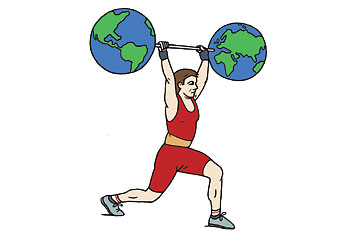
"Sport has the power to change the world, the power to inspire, the power to unite people in a way that little else can. Sport can create hope ... It is an instrument for peace."
When a man like Nelson Mandela looks back over his life and, against the backdrop of all that he had to endure, pinpoints sport as a unique force for good, we should sit up and take notice. During his 27 years in captivity, mainly on Robben Island, sport helped sustain the spirits of Mandela and his fellow inmates. And not any sport. The prisoners turned to rugby, the game that more than any other embodied white South Africa. Then, in 1995, as the new President of South Africa, Mandela, handed the Rugby World Cup trophy to the captain of the victorious Springboks, Francois Pienaar. In a single moment a divided and fractured nation was united.
For me, events like these confirm how sport can and must play a wider role in our societies. Sport's economic power is now well established, global and growing. Each week from August to May the Premier League in England is watched by nearly 100 million people, turning players and teams into heroes and role models. In Sierra Leone recently, I saw kids playing football everywhere, proudly wearing their Manchester United and Arsenal shirts. American leagues, which have been traditionally insular, are venturing outside their geographic borders to stage games in Europe and Asia. Cities make huge efforts when bidding to stage major sporting events, not just for their commercial worth but for the long-term social benefits that are the legacy of such events. I am convinced the 2012 Olympic Games will regenerate East London and inspire an entire generation of children.
But this isn't just a question of economics. Sport has enduring qualities. It shows us how to participate in something that is bigger than ourselves, and teaches us how to demonstrate respect for teammates and opponents. It helps us learn how to win with humility and lose with grace; how to set a goal and fulfill it. Sport brings people together; the self-worth and self-belief that it teaches are values that can last a lifetime.
And sport can do even more. In a recent survey taken by UK Sport and TNS Sport, 78% of the British public agreed that sport and active recreation can help to tackle social problems while 73% believed it can reduce crime. Watching a junior school tennis tournament recently in the northeast of England, sponsored by the foundation I set up to promote grass-roots sport, I was struck by two things: it was the first opportunity for many of these children to play tennis, and they were loving it. Sport liberates potential — not just physically but psychologically, too.
The really big question now is whether sport can achieve good on a scale previously unimagined. I think it can. Consider some of the projects already in progress that are having a significant impact. The Homeless World Cup has inspired nearly 50 grass-roots football projects around the world, working with homeless and excluded people. Most of the players each year change their lives for the better, by coming off drugs and alcohol, moving into jobs reuniting with their families, and even going on to become players and coaches for football teams.
A new global initiative whose board I will chair will draw together the most inspirational people, projects and organizations in sport. Beyond Sport will celebrate their achievements, identify why they succeed, and use them to inspire others. The Beyond Sport Awards will recognize and reward those individuals, projects and organizations that have created positive social change through sport. Our message will be championed by our ambassadors — from sporting heroes like Lucas Radebe, South Africa's most capped footballer and Lord Sebastian Coe, London 2012 chairman, to media visionaries such as American Idol creator Simon Fuller. Through the UNICEF Child Rights Award, Beyond Sport will recognize the vital role that sport can play in helping to fulfill children's rights, as laid out in the United Nations Convention on the Rights of the Child.
We all have much to learn from the great programs and projects running all over the world. Now is the time to make heroes of individuals and organizations that use sport to really make a difference. Now is the time for sport to show how much it can achieve beyond sport.
Tony Blair, Britain's Prime Minister from 1997-2007, is special envoy to the Middle East for the U.N., the E.U., the U.S. and Russia. For more on Beyond Sport, go to www.beyondsport.org